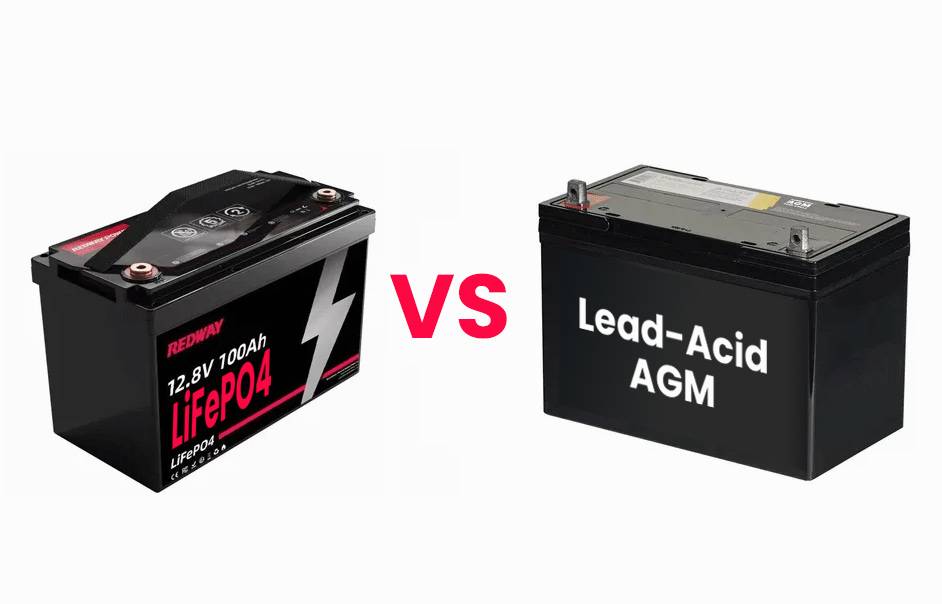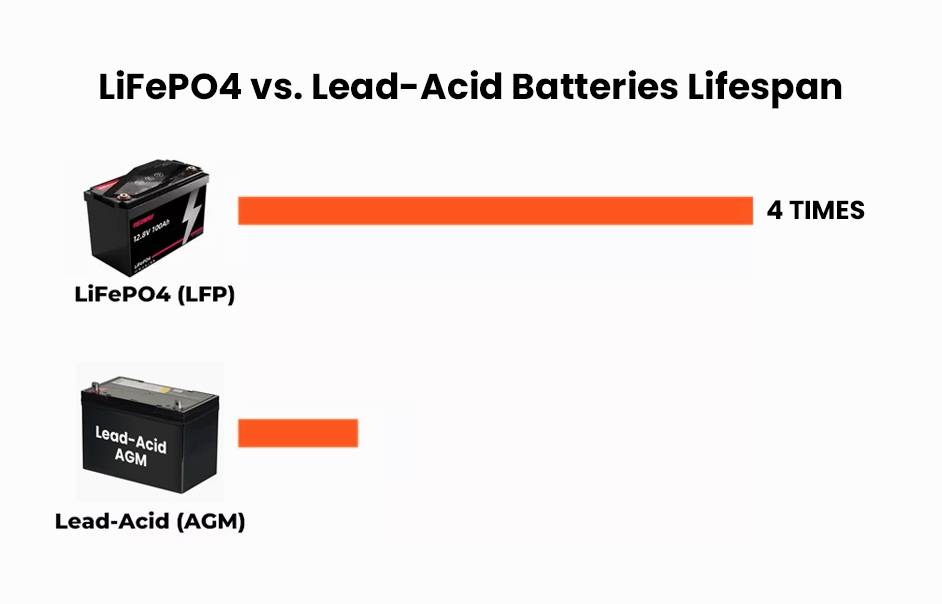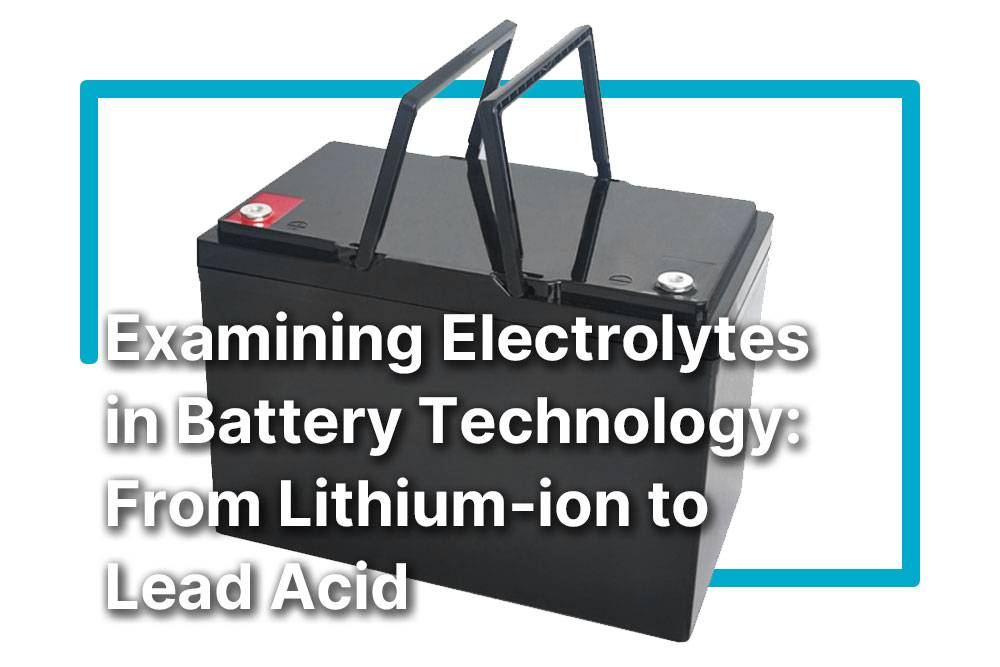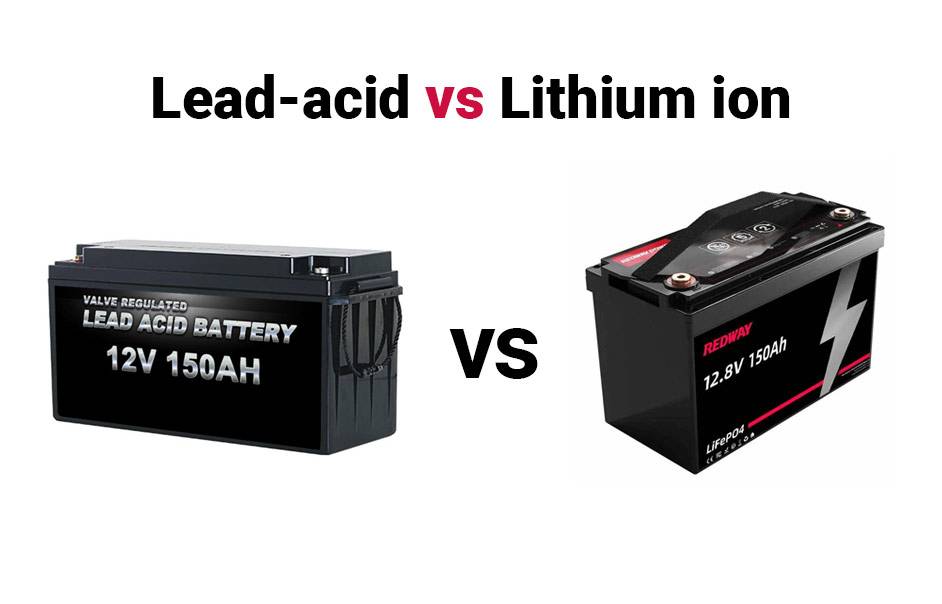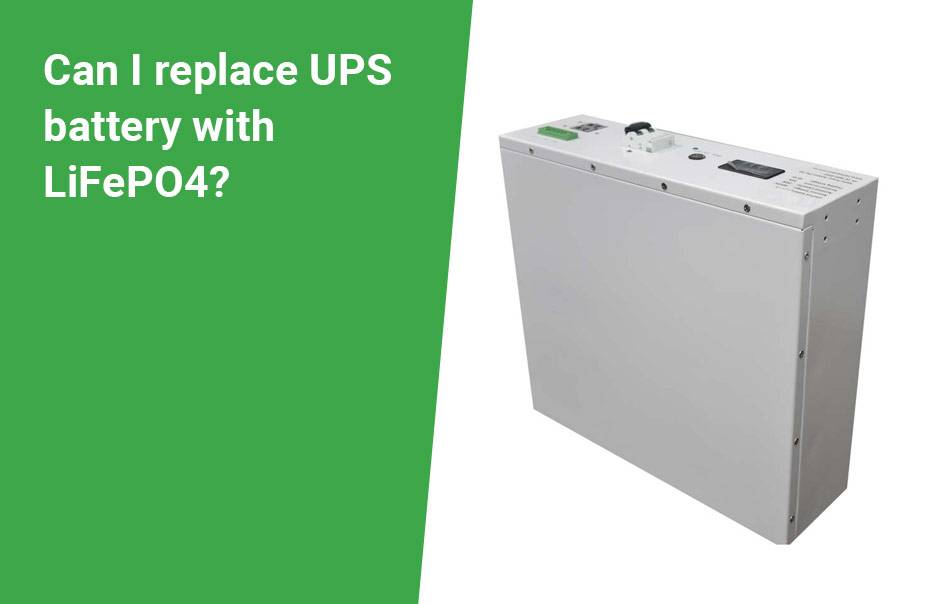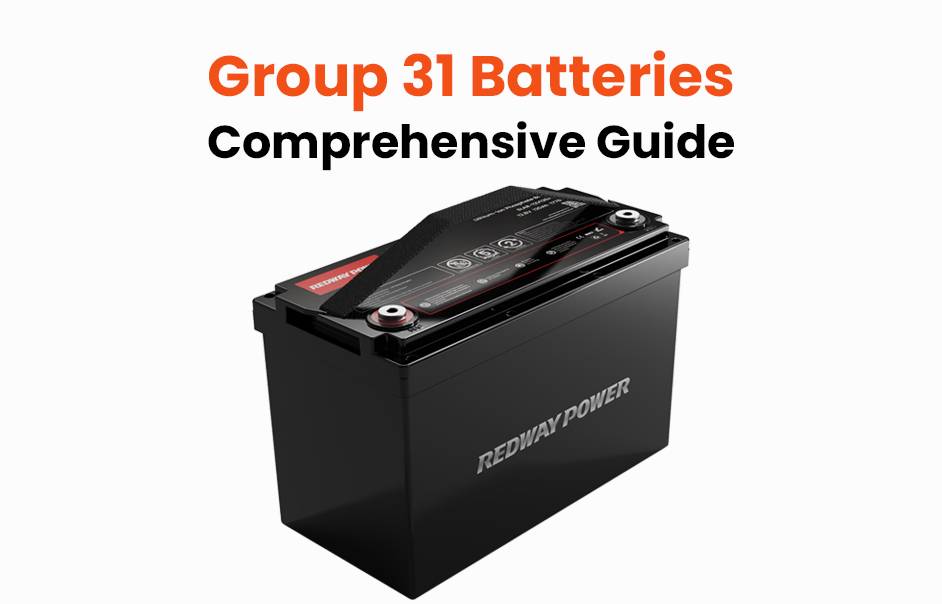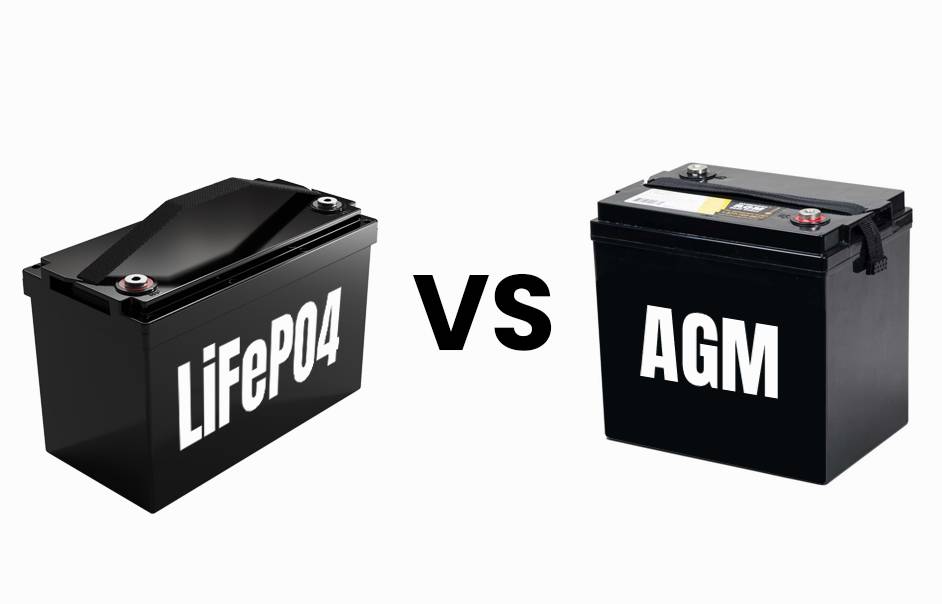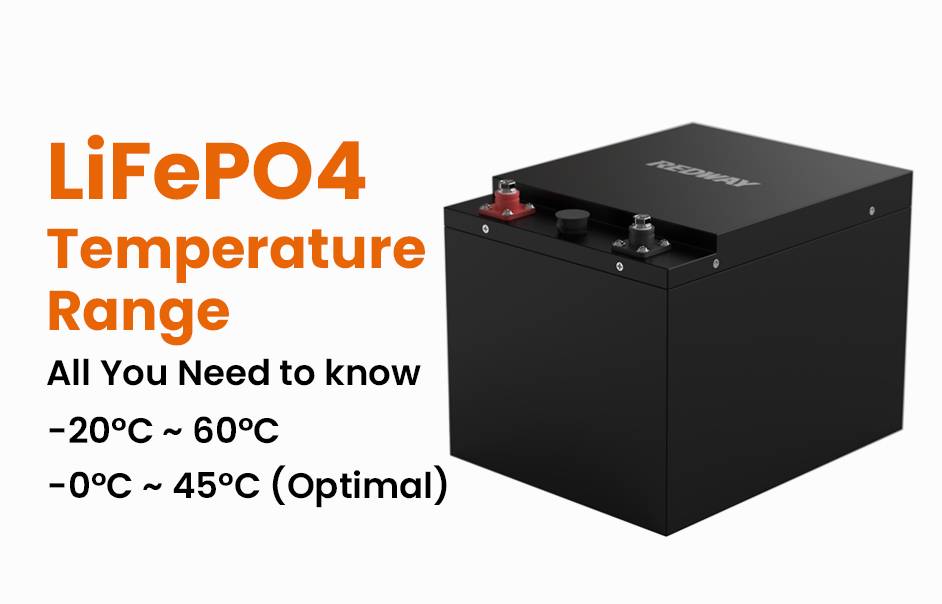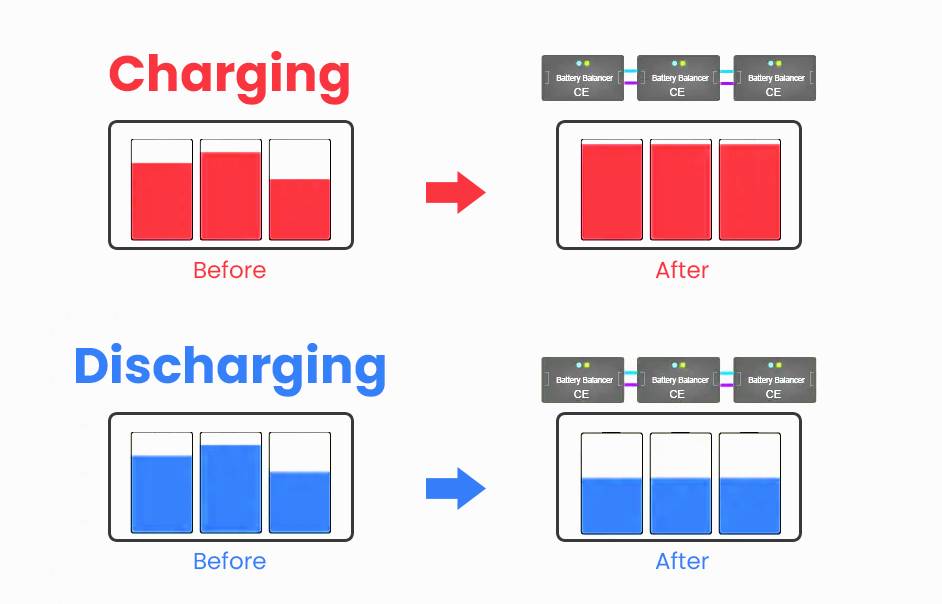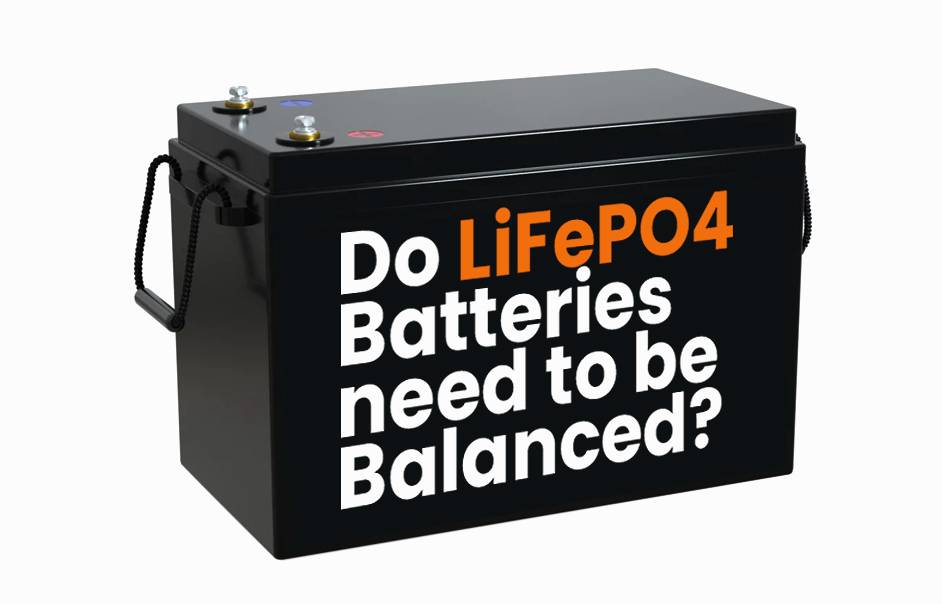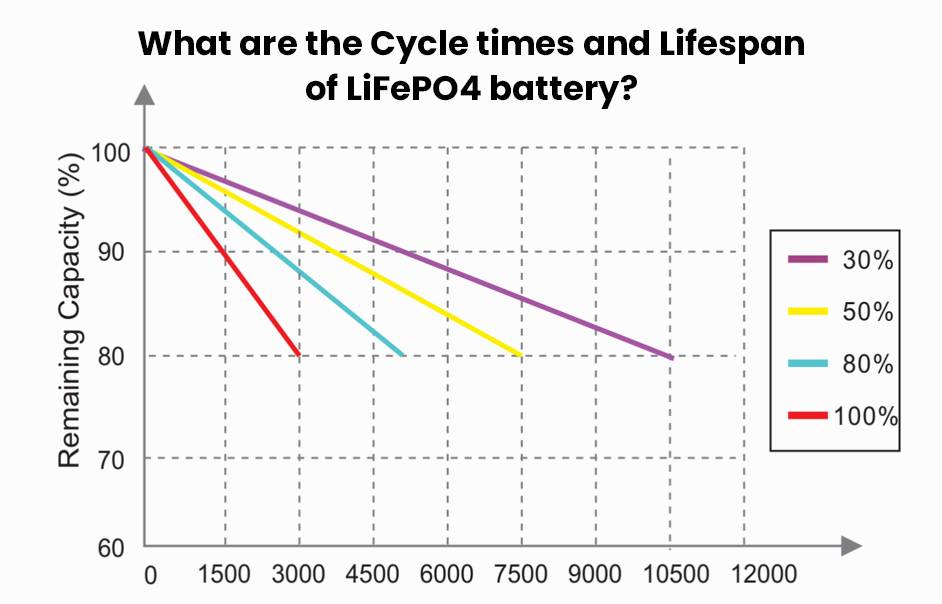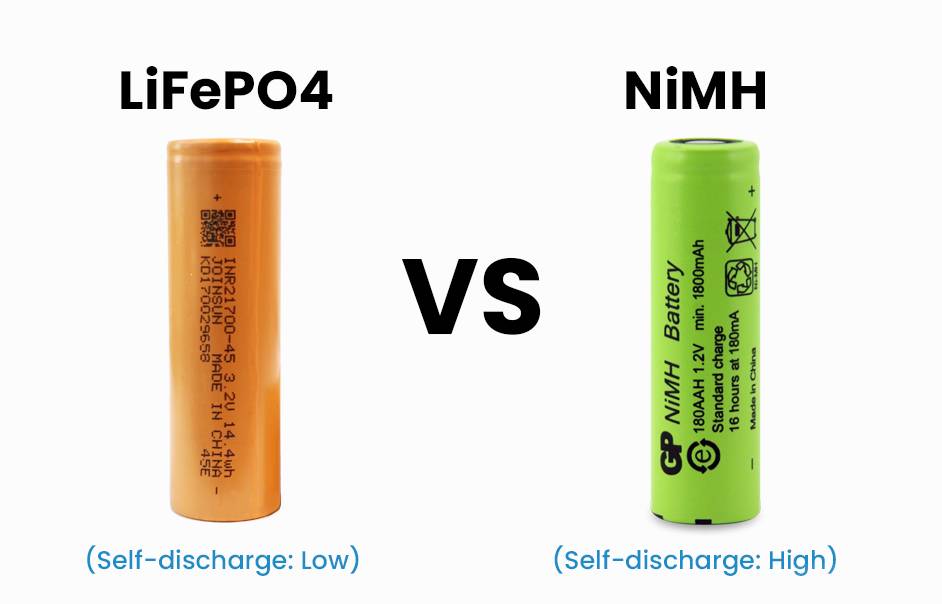LiFePO4 batteries are increasingly recognized as a dependable and cost-effective substitute for traditional lead-acid batteries. This article delves into the transformative aspects of LiFePO4 batteries, elucidating the reasons that render them a valuable investment.
What Are LiFePO4 batteries?
LiFePO4 batteries, short for Lithium Iron Phosphate batteries, are a type of rechargeable lithium-ion battery known for their high energy density, long cycle life, and enhanced safety features compared to other lithium-ion chemistries.
What Are Lead-Acid Batteries?
Lead-acid batteries, comprised of lead plates in sulfuric acid electrolyte, offer reliability and low cost but are heavy and have low energy density. Widely used in automotive SLI systems and backup power applications, they require maintenance and have limited applications due to weight and energy storage constraints. Despite being overshadowed by newer technologies like lithium-ion, lead-acid batteries remain prevalent for their robustness and affordability, particularly in sectors prioritizing cost-effectiveness over weight and energy density considerations.
Are LiFePO4 batteries worth it?
Are LiFePO4 batteries worth the investment? Absolutely! Here’s why:
- Extended Lifespan and Cost-Effectiveness:
- LiFePO4 batteries outshine lead-acid counterparts with up to four times longer lifespan.
- Withstanding more charging cycles, they prove to be a cost-effective and durable choice.

- Lightweight and Compact Design:
- Ideal for portable electronic devices like laptops, phones, and cameras.
- Their lightweight and compact nature enhance versatility and convenience.
- Overall Advantages for Various Applications:
- Long lifespan, safety, high energy density, environmental friendliness, and low maintenance requirements.
- A wise investment across multiple applications, ensuring reliability and efficiency.
While LiFePO4 batteries come with a higher upfront cost, their unparalleled benefits make them a smart choice for those prioritizing longevity and performance over immediate costs. Choose LiFePO4 for a lasting and efficient power solution!
Why LiFePO4 batteries are a game-changer in energy storage?
Why are LiFePO4 batteries a game-changer in energy storage? Let’s explore the key reasons:
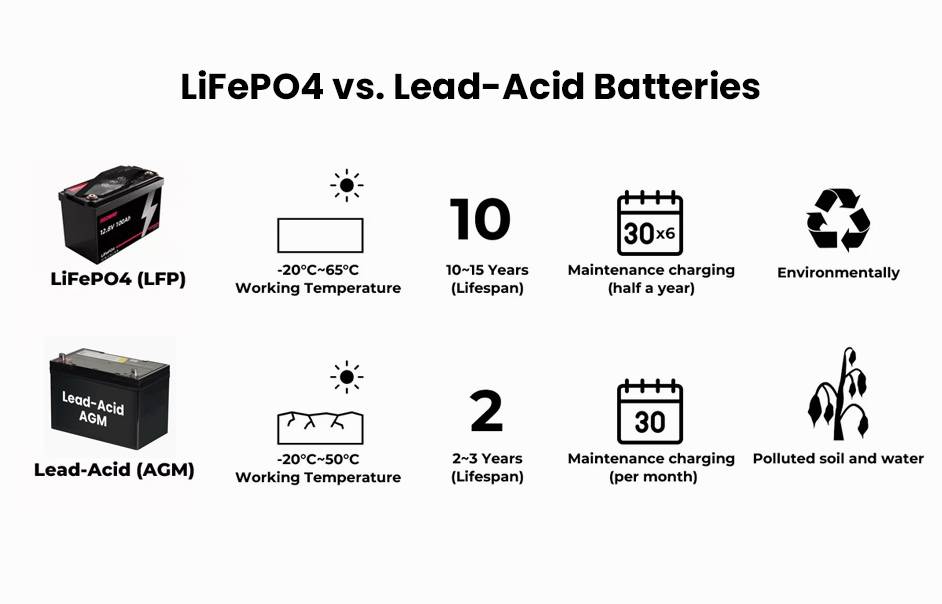
1. High Safety Standards:
- LiFePO4 batteries ensure a superior level of safety compared to other lithium-ion types.
- Minimized risks of overheating, thermal runaway, and explosions, making them ideal for safety-critical applications.
2. Extended Lifespan and Cost-Effectiveness:
- Boasting a prolonged lifespan of up to ten years or more with proper care.
- Their durability translates to a cost-effective option for diverse applications.
3. Fast Charging and Temperature Tolerance:
- LiFePO4 batteries stand out with faster charging capabilities, crucial for applications requiring swift replenishment.
- Maintaining optimal performance even in high-temperature environments, ensuring reliability.
4. Environmental Friendly and Low Maintenance:
- Free from toxic heavy metals like lead or cadmium, aligning with environmental friendliness.
- Minimal maintenance requirements and a low self-discharge rate ensure extended charge retention.
In summary, LiFePO4 batteries revolutionize energy storage by prioritizing safety, longevity, fast charging, temperature tolerance, environmental sustainability, and low maintenance. These qualities enhance performance and safety across applications, ranging from electric vehicles to renewable energy storage systems. Opt for LiFePO4 batteries for a reliable and sustainable energy storage solution!
The Value of Investing in LiFePO4 Batteries
Investing in LiFePO4 batteries proves worthwhile for several compelling reasons. Let’s break it down:
1. Extended Lifespan for Cost-Effectiveness:
- LiFePO4 batteries outshine other rechargeable options with a lifespan of up to ten years or more.
- This longevity, coupled with proper care, positions them as a cost-effective choice for applications like electric vehicles and renewable energy storage.
2. High Energy Density for Compact Design:
- Boasting a superior energy density, LiFePO4 batteries can store more energy in a smaller and lighter package.
- Ideal for applications with space and weight constraints, such as portable electronics and electric vehicles striving for longer driving ranges.
3. Safety Features and Temperature Tolerance:
- LiFePO4 batteries prioritize safety, exhibiting a lower risk of overheating, thermal runaway, and explosions.
- Crucial for safety-critical applications like electric vehicles, where they also showcase high temperature tolerance for reliable performance.
In conclusion, LiFePO4 batteries stand out as a wise investment due to their extended lifespan, high energy density, and enhanced safety features. Tailored for applications with extensive battery use, their initial higher cost is justified by long-term benefits, including reduced maintenance expenses and prolonged lifespan. Opt for LiFePO4 batteries for a reliable, efficient, and secure energy storage solution!
LiFePO4 Batteries: Unleashing Long-Lasting Power Solutions
Embracing lithium-ion technology has become a popular choice for its high energy density, rapid charging, and extended lifespan. Redway Battery, a prominent Chinese manufacturer, stands out in this landscape, specializing in crafting top-notch custom lithium-ion batteries tailored for diverse applications.
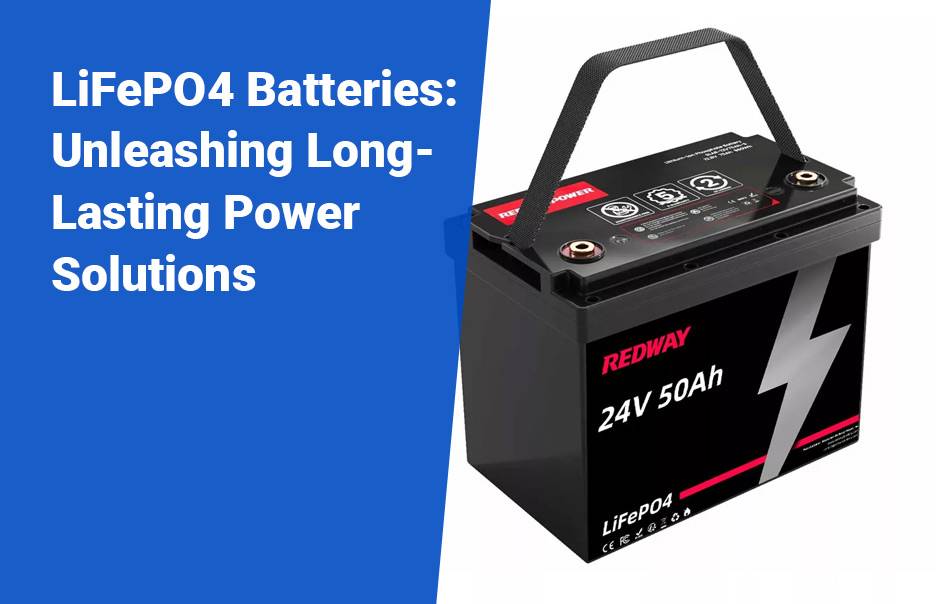
1. Tailored Efficiency for Specific Needs:
- Custom lithium batteries, like those from Redway Battery, can be precisely designed for specific applications, optimizing space, weight, and energy utilization.
- This tailored approach is exemplified in electric vehicles, where Redway’s custom lithium batteries enhance driving range and expedite charging compared to conventional lead-acid counterparts.
2. High Energy Density for Compact Solutions:
- Custom lithium batteries boast exceptional energy density, allowing them to store more energy in a smaller, lighter package.
- This characteristic proves ideal for applications with space and weight constraints, such as portable electronics and wearable devices.
3. Long Lifespan and Environmental Responsibility:
- Custom lithium batteries, with their extended lifespan exceeding ten years with proper care, result in substantial long-term cost savings.
- Contributing to environmental responsibility, these batteries do not contain toxic heavy metals like lead or cadmium, making them an eco-friendly choice for renewable energy storage systems.
In summary, the shift to custom lithium batteries, championed by manufacturers like Redway Battery, brings forth advantages like enhanced energy density, prolonged lifespan, and eco-friendliness. Investing in these tailored solutions enables businesses and individuals to elevate the performance and efficiency of their devices while aligning with environmental responsibility. Choose custom lithium batteries for a cutting-edge and sustainable energy storage solution!
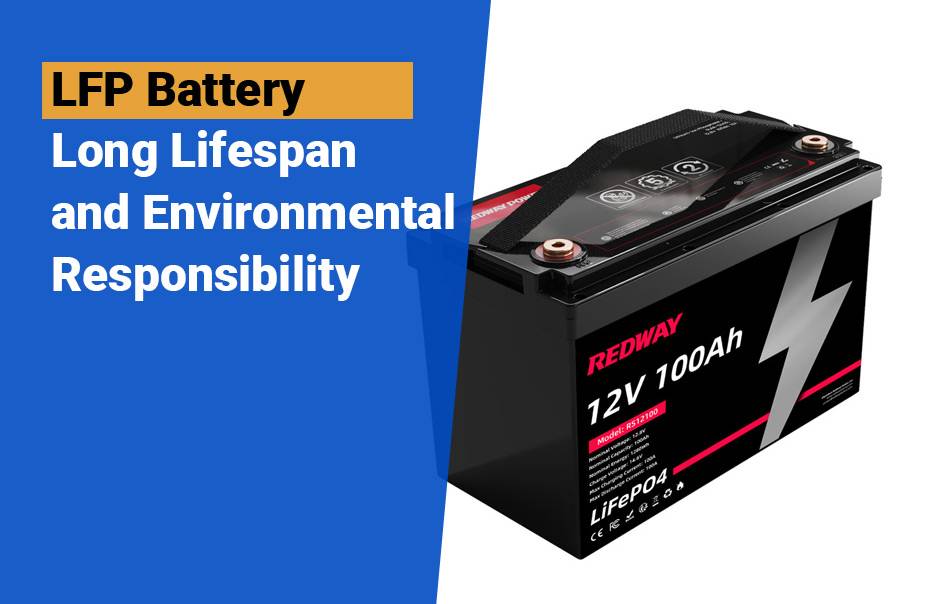
Why choose lithium batteries over lead-acid and gas generators for sustainability?
Choosing lithium batteries over lead-acid and gas generators for sustainability has clear advantages. Lithium batteries are environmentally friendly, emitting no pollutants and containing no toxic materials. They offer longevity, require minimal maintenance, and are energy-efficient. Overall, they contribute to cleaner energy solutions and reduce dependence on fossil fuels.
- Clean and Green: Lithium batteries produce no emissions and don’t contain toxic materials like lead or sulfuric acid, making them eco-friendly.
- Efficient Power: They’re more energy-efficient than lead-acid batteries and gas generators, meaning they can deliver power more effectively without wasting energy.
- Low Maintenance: Lithium batteries require minimal maintenance compared to lead-acid batteries, which need regular topping up with water and equalization charges.
- Longevity: They have a longer lifespan than lead-acid batteries and gas generators, reducing the need for frequent replacements and minimizing waste.
- Reduced Dependence on Fossil Fuels: By choosing lithium batteries, we’re moving towards cleaner energy solutions and reducing our reliance on fossil fuels.
Overall, lithium batteries offer a sustainable and practical choice for powering various applications while minimizing environmental impact and promoting energy efficiency.
Why switch to lithium batteries?
Switching to lithium batteries offers significant advantages:
- Longer Lifespan: Lithium batteries outlast lead-acid, reducing replacements.
- Efficiency: They maintain consistent power delivery, unlike lead-acid.
- Fast Charging: Lithium batteries charge quickly, minimizing downtime.
- Environmentally Friendly: They’re eco-friendly, with no harmful emissions.
- Versatile and Future-Proof: Lithium batteries adapt to various applications and technological advancements.
FAQs
What is the difference in energy density between LiFePO4 and lead-acid batteries?
The energy density of LiFePO4 batteries is typically several times higher than that of lead-acid batteries, but it’s not as drastic as 100 times. In practical terms, LiFePO4 batteries can store roughly 2 to 4 times more energy per unit of weight compared to lead-acid batteries. However, the exact difference can vary depending on specific battery designs and configurations.
Which battery type has a longer lifespan, LiFePO4 or lead-acid?
LiFePO4 batteries generally have a lifespan that is significantly longer than lead-acid batteries, but it’s not typically as extreme as 100 times longer. In practical terms, LiFePO4 batteries can often endure around 5 to 10 times more charge-discharge cycles compared to lead-acid batteries before experiencing significant degradation. However, this can vary based on factors such as usage conditions, depth of discharge, and battery management practices.
Are LiFePO4 batteries safer than lead-acid batteries?
Yes, LiFePO4 batteries are generally considered safer than lead-acid batteries. They are more resistant to thermal runaway and less prone to catching fire or exploding, making them a preferred choice for applications where safety is paramount, such as in electric vehicles and home energy storage systems.
How do the maintenance requirements differ between LiFePO4 and lead-acid batteries?
The maintenance requirements for LiFePO4 batteries differ significantly from lead-acid batteries. Lead-acid batteries typically require regular maintenance such as electrolyte topping-up, equalization charges, and periodic checks for corrosion. On the other hand, LiFePO4 batteries have minimal maintenance needs. They do not require electrolyte maintenance, and their solid-state construction reduces the risk of corrosion. This results in lower overall upkeep efforts and costs for LiFePO4 batteries compared to lead-acid batteries.
Which battery technology is more suitable for renewable energy storage systems?
LiFePO4 batteries are more suitable than lead-acid batteries for renewable energy storage due to their higher energy density, longer lifespan, and lower maintenance needs. With a higher energy density, LiFePO4 batteries can store more energy per unit of weight or volume, optimizing space in renewable energy systems. Their longer lifespan allows for extended use in such systems, while their reduced maintenance requirements lower overall upkeep costs. Additionally, LiFePO4 batteries offer improved safety features, minimizing the risk of thermal runaway or fire incidents. These advantages make LiFePO4 batteries the preferred choice for storing energy from renewable sources like solar or wind power.
What are the weight differences between LiFePO4 and lead-acid batteries?
LiFePO4 batteries are typically lighter than lead-acid batteries for the same energy capacity. On average, a LiFePO4 battery with 1 kWh of energy storage capacity may weigh around 10 to 20 kilograms, while a lead-acid battery with the same energy capacity could weigh around 20 to 30 kilograms. Therefore, LiFePO4 batteries generally offer a weight advantage over lead-acid batteries, making them preferable in applications where weight is a consideration, such as in portable electronics, electric vehicles, and off-grid renewable energy systems.
In what applications are LiFePO4 batteries superior to lead-acid batteries, and vice versa?
LiFePO4 batteries outperform lead-acid batteries in electric vehicles, renewable energy storage, portable electronics, marine/RV, and off-grid power due to higher energy density, longer lifespan, and lighter weight. Conversely, lead-acid batteries maintain dominance in automotive SLI systems, standby power, and low-cost energy storage applications due to their affordability and widespread availability. LiFePO4 batteries offer superior efficiency and longevity, making them preferred for applications prioritizing energy efficiency, durability, and weight savings. However, lead-acid batteries remain competitive where upfront cost is paramount, demonstrating a balance between performance and affordability in diverse energy storage needs.
What are the considerations for battery installation when using lithium or lead-acid batteries?
When installing lithium batteries, it is important to note that the cells are sealed and do not leak, allowing for flexibility in orientation during installation. In contrast, lead-acid batteries should not be installed in an inverted position to avoid potential issues with venting due to gas release through vents. This difference in design consideration between lithium and lead-acid batteries impacts the permissible installation orientations and handling requirements.
How does the cold temperature performance of lithium batteries compare to lead-acid batteries?
In comparing the cold temperature performance of lithium batteries to lead-acid batteries, it is important to consider both charging and discharging capabilities. When operating in cold temperatures, lithium batteries may not accept a charge below 32°F, whereas lead-acid batteries can still receive low current charges under similar conditions. However, despite this limitation in charging, lithium batteries exhibit a higher discharge capacity than lead-acid batteries at cold temperatures. This means that lithium batteries do not necessarily need to be over-designed for cold conditions, with their discharge capacity remaining higher compared to lead-acid batteries. For example, at 0°F, lithium batteries can still discharge at 70% of their rated capacity, whereas lead-acid batteries drop to 45%. Thus, while charging may be a limiting factor for lithium batteries in cold temperatures, their superior discharge capacity gives them an advantage over lead-acid batteries in such conditions.
How does the constant power delivery of lithium batteries differ from lead-acid batteries?
The constant power delivery of lithium batteries differs from lead-acid batteries in how they maintain power output throughout the discharge cycle. Lithium batteries provide a consistent amount of power from the beginning to the end of their discharge cycle, maintaining a steady voltage level. This means that the power delivered by a lithium battery remains constant, as the current demand does not fluctuate. In contrast, lead-acid batteries start off strong but their power delivery gradually decreases as they discharge, resulting in a diminishing power output over time. This difference in power delivery is illustrated by the fact that lithium batteries maintain a consistent brightness when powering a device, while lead-acid batteries may exhibit a decrease in performance as they near the end of their charge.
How does the cyclic performance of lithium batteries compare to sealed lead-acid batteries?
In comparison to sealed lead-acid batteries, lithium batteries demonstrate superior cyclic performance due to their unique characteristics. One key advantage is that the capacity of a lithium battery remains consistent regardless of the discharge rate, making it more efficient for cyclic applications requiring high discharge rates. This means that even with a lower capacity rating, a lithium battery can often outperform a comparable lead-acid battery in practical use. The upfront cost of lithium batteries may be higher, but their ability to deliver consistent capacity and longevity over multiple cycles can result in a more cost-effective ownership experience when compared to lead-acid batteries.
What is the difference between lithium and sealed lead-acid batteries?
When comparing lithium and sealed lead-acid batteries, it is essential to consider various factors to understand the differences between the two battery chemistries. Both lithium and sealed lead-acid batteries have unique strengths and weaknesses that should be taken into account before selecting the appropriate battery for a specific application.
How do the charging times of lithium batteries compare to sealed lead-acid batteries?
LiFePO4 batteries stand out with faster charging capabilities, crucial for applications requiring swift replenishment. This rapid charging feature of LiFePO4 batteries ensures that devices can be quickly powered up, making them ideal for scenarios where prompt recharging is essential for uninterrupted operation. Unlike traditional sealed lead-acid batteries, which are known for their slower charging times, LiFePO4 batteries offer a notable advantage with their efficient charging process. This swift replenishment not only enhances the overall performance of devices but also minimizes downtime, providing seamless power availability for various applications.

